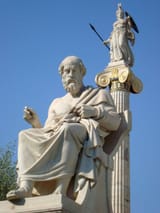If, according to Plato’s Theory of Forms, every perfect Form (such as Beauty, Justice, or Goodness) exists beyond the physical world, could the Form of the Good be understood as equivalent to God? And if so, what implications would that have for the nature of divine perfection, creation, and the human soul’s quest for truth?
>>24464680Most of them are not by me retard, KYS
I don't think that it's appropriate to think of the Form of the Good as being God. Plato posits the existence of a Demiurge who created the world in /accordance/ with the Form of the Good, but the Demiurge is not the Form of the Good itself.
>>24464688The Demiurge is not God, God and the Demiurge are difference between good and evil
>>24464680one of those is mine (the one about the ultimate form of the good), but yeah this retard has been spamming all fucking day lol
>>24464692This is Platonism, not Gnosticism. Plato's Demiurge is neither good nor evil.
>>24464700Why do you care about Demiurge that much?
>>24464701I really don't. It's a rather inconsequential part of Plato's philosophy.
>>24464703Then why you talk about him so much, have you met him before?
>>24464704You don't know who you're talking to, because this board doesn't have IDs.
>>24464681Look through the catalog before posting redundant threads, retard
>>24464660 (OP)Perfect forms cannot exist, and the theory of the forms is escapism in the shape of denial of reality. We recognize forms from experience, not from supernatural intuition to an unseen world. The theory of forms (and Kant's subsequent noumenal fiasco) build a worldview on a flawed and highly contested presupposition.

